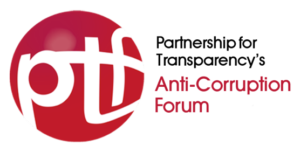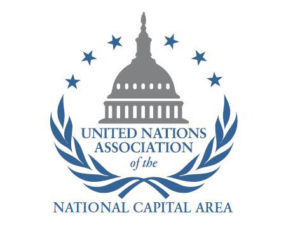

On September 20, 2018, UNA-NCA’s International Law Committee and The Partnership for Transparency Fund presented The Critical Challenges of Human Trafficking and Corruption before an overflow crowd at the United Nations Foundation.
Human Trafficking and Corruption are too often considered in separate silos. This program demonstrated that they are inextricably connected. Organized crime could not pursue human trafficking without the explicit cooperation of public officials.
Principal Speaker Katie Ford, former CEO of Ford Models and founder and CEO of Freedom For All, told the chilling stories of two young women who had become human slaves and, fortunately, were saved by Katie’s organization.
The first woman’s name is Grace, a native of an African country, with a graduate degree in Norway. Grace’s story started after she responded to a job offer in a Gulf country, little did she know that she would soon be forced to work in a sexually abusive environment as a domestic worker. Not only did she receive no pay for her work, but she was told she owed a debt of $2,500 to her captors.
When others in similar situations were told by a woman from their home country that she would pay their debt, they were forced into prostitution and some were never heard from again. Grace was rescued by Katie’s organization. After being rescued Grace started an organization to prevent others from being trafficked.
Soon after a man named Sam, promised to help her start the organization and became the organization’s first chairmen, ended up sexually harassing Grace as well. As Katie described it, every aspect of Grace’s story was marred with bribes and corruption.
While a majority of the victims come from developing countries and Central and Eastern Europe, they all too often end up enslaved in Western developed countries. The second woman’s name was Shandra. Shandra had earned a college degree and had been a trader at an international bank in Indonesia. She paid $3,000 to get a job in the United Sates. She was provided with a visa and a flight to New York City, was greeted upon arrival with a professional looking sign. Upon arrival at the house where she expected to work, a gun was placed to her head and she was forced to work as a prostitute in New York City and Connecticut. She was sold from person to person and even escaped twice, but to no avail, the police she turned too after escaping didn’t even believe her story. While the United States is the leader in combatting trafficking, it’s police force still lacks the necessary funding for adequate training and enforcement.
Principal Speaker Amb. Lou deBaca, now a professor at Yale University, was formerly Ambassador-at-Large and Senior Advisor to the Secretary of State on Trafficking in Persons, and Director of DOJ’s Office of Sex Offender Sentencing, Monitoring, Apprehending, Registering, and Tracking (“SMART”).
Ambassador deBaca placed the issues at this forum in both an historical and a public policy context. He not only noted the long history of slavery, but summarized events in the U.S. that underscored that forms of human slavery have continued here and are rarely prosecuted. He stressed that while much is being done to counter both corruption and human trafficking, the responses are far too little, given the magnitude of the problems and the highly organized approaches of the criminals running transnational human trafficking operations.
Panelist Kelly Ann P. Whelan, Consultant to the UN Office on Drugs and Crime, Vienna, provided a UN perspective, noting its engagement, as well as her recent experiences in Ukraine. The country situation she described added significantly to the audience’s knowledge of not only how pervasive trafficking is, but of how it is enabled by corrupt public officials at every level.
Panelist Frank Vogl, Co-founder of Transparency International and Partnership for Transparency Fund, and author of the recent book Waging War on Corruption, stressed that legal solutions alone will not suffice and that the challenge has to be seen as well from a moral perspective. Now, on the 70th anniversary of the Declaration of Human Rights, it is imperative that efforts be redoubled on every front to counter human trafficking. The goals of human rights and anti-corruption organizations are fundamentally the same– to ensure that everyone everywhere can live a life of dignity. This demands far deeper partnerships between civil society organizations engaged in countering human trafficking and those in the realm of anticorruption.
In a discussion that was moderated by Robert Craft, Senior Counsel, Sullivan & Cromwell, and Co-chair of UNA-NCA’s International Law Committee, the audience’s questions largely focused on what practical measures could and should be taken. One question from the audience asked about the use of crypto-currencies as ways the traffickers secure illicit funds without detection. The panelists noted that so far this does not appear to be a major factor, but more generally efforts to curb international money laundering need to be a major part of the assault on the criminals engaged in trafficking.

